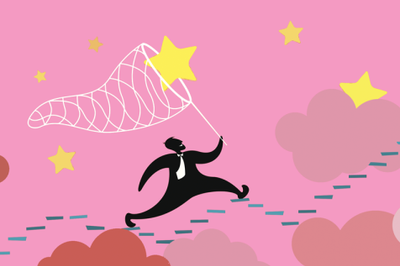By Liz Massey, May 2015 Issue.
Some people seem to be made differently than you or I: We’re struggling to get out the door to work every day while they are running marathons in every state. We’re trying to carve out time for a Netflix marathon weekend and they’re taking selfies at every “Better Call Saul” shooting location in New Mexico. You get the idea.
But what if these people weren’t all that different from you or I? What if they had just found a tiny bit more direction to their life through their pursuits? That theory is the centerpiece of Chris Guillebeau’s new book, The Happiness of Pursuit. In it, he advocates finding a “quest” – an adventure or project of some sort – in order to bring greater purpose to one’s life.
Guillebeau asserts that a good quest will a) have a clear goal and a definite end point in time, b) is an activity that should challenge and stretch the quester and c) involves some sacrifice of time or money to accomplish. The quests he mentions in his book, most which often involve epic travel, remarkable creative output or activities tied to charitable fundraising, remind me of a concept I came up with a few years ago called a “worthy project.” The point of a worthy project is that it helps you make meaning; as it grows, it often takes on a life of its own and scares you a little bit!
Even if the terms quest or worthy project are new to you, our community has been built by people on their own personal quests. Think about Frank Kameny, the astronomer who responded to losing his government job in 1957 by dedicating the rest of his long life to pioneering gay rights advocacy, including removing homosexuality as a category of mental illness and campaigning for employment anti-discrimination laws in the U.S civil service system. Or Del Martin and Phyllis Lyon, who co-founded the Daughters of Bilitis in 1955 and were visible lesbian role models decades before anyone else.
When AIDS ravaged our tribe in the 1980s, many in our community made effective treatment and a cure for the disease their permanent and ongoing quest.
More recently, local activist Meg Sneed-Dupps took her passion for marriage equality and orchestrated the Equality Walks, which took dialog about LGBT equality to towns and cities across Arizona each summer from 2008 to 2014.
Whether one picks a frivolous or serious focus for their quest, it can benefit the LGBT and allied community, both directly and indirectly. Undertaking a quest can help us:
Provide LGBT visibility.
Even if it just presents us as an out queer person doing something amazing.
Experience self-expression and “flow.”
Enjoying our quest can help relieve stress, and a happy LGBT person is a better advocate for the community (not to mention being good PR for us, too).
Take a stand and empower others.
For quests related to causes, having an example to follow can help many previously unengaged people envision themselves taking action, as well.
Offer inspiration and entertainment.
If you share your quest through a blog or social media, your audience may at least spread the word about your exploits and cheer you on.
One of the reasons quests are so powerful, no matter their scope or scale, is that they provide inner-directed motivation, something difficult to find in our consumer society, which often focuses on offering easily monetized pre-packaged answers.
It’s also an antidote to passivity, one of the primary weapons (along with the promotion of ignorance-based fear) used by the extreme right wing to suppress the rights of anyone labeled “other.”
Is it possible to have a quest go wrong? Sure. We can fail to walk away from a quest that’s outlived its usefulness or lose sight of the project’s place in our life, but as the ultimate defiance of despair and inertia, quests represent something our community needs, now and in our hopefully equality-laden future.
Near the end of his book, Guillebeau writes, “Why pursue a quest? Because each of us in our own lives is writing our own story, and we have only one chance to get it right.”
Having a project that gives us something to organize our energies around helps us pick a theme for our story, and may even create an adventure that exceeds our highest expectations.
